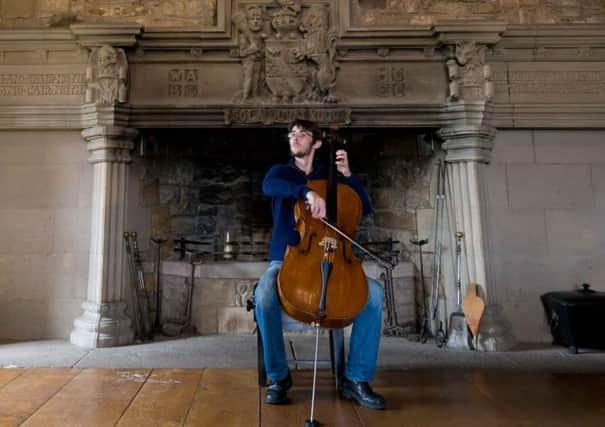Philip Higham’s journey of rediscovery


Philip Higham is obsessed with journeys, and loves sharing them with his audiences. In his most recent CD for go-getting Scots record label Delphian, which came out earlier this summer, the Edinburgh-born cellist set out to explore the highways and byways of Bach’s six solo suites for the instrument, and almost by chance found a whole new way for us to listen to the apogee of the set, the sixth and final suite.
For rather than take a traditional route through the entire collection – which Higham so impressively did in the 2010 Lammermuir Festival – he threw in a delightful surprise by performing the last suite on the 5-stringed cello he acquired a year ago. It meant re-recording that particular work, and consequently holding up the release of the CD, but he wanted to share the joy he had experienced in discovering the transformation this instrument brought to the music.
Advertisement
Hide Ad“It was effectively a rediscovery of a piece I already thought I knew,” Higham explains. “And it wasn’t just because it felt so different to play, but because it enabled one to really see why Bach chose this particular instrument for this piece. It’s not as even in strength over the whole register, but it produces very distinct colours in each register. I think that’s what Bach was getting at in the sixth suite.”
The entire CD has a fresh and thoughtful quality to it, as most reviewers, including myself, noted at the time. Higham’s reputation is unquestionably on the up. Even the influential strings magazine The Strad described the 30-year-old as having “all the qualities of a world class artist”.
You can judge for yourselves this afternoon, when Hingham teams up with Irish cellist Kim Vaughan for a duo recital in Seton Collegiate Church, Longniddry as part of this year’s Lammermuir Festival. And guess what, he’s calling the programme another journey.
“It needs a bit of explanation,” says the former St Mary’s Music School pupil, who went on to study at Manchester’s Royal Northern College of Music, before becoming one of the youthful elite supported by the Young Classical Artist Trust (YCAT) programme. “We’ve called it Divisions and Diversions’ [Divisions being the old word for variations], though I’m looking at it now and thinking it could also be called ‘From Biber to Britten’. It’s really a play on putting together music that is based on the variation concept of Ground Bass, interspersed with music that is much more capricious and less tightly bound by structural dogma.”
Higham opens with a transcription of Heinrich Biber’s wildly virtuosic Passacaglia for Solo Violin, a work ingeniously shaped around a recurring pattern of four descending notes. “Kim and I will follow that with one of the most entertaining styles of music, by Italian composer [Giuseppe Maria] Jacchini, from the late 17th century. He gives you four movements in only four minutes!”
Then there’s music by 17th century composer Christopher Simpson, treatise writer on the art of playing the division viol (a kind of bass viol capable of startling flexibility), Couperin, Sally Beamish (a transcription of her catchy Prelude and Canon for 2 Violins based on highland bagpipe and Scottish fiddle music) and Benjamin Britten.
Advertisement
Hide AdThat final choice – Britten’s Cello Suite No 2 – is as relevant to Higham’s own journey as it is to today’s Lammermuir mission. It was a recording of the Britten Suites, again on Delphian, that first brought him to prominence as a recording artist. But why include this particular suite?
“I’m ending with it because the last movement is a magnificent chaconne, similar in basic design to Biber’s Passacaglia, but substantially more complex,” he says. “It ends a journey that takes us from the solemnity of Biber to the brilliance of Britten.”
Advertisement
Hide AdBut that’s not the only sense of adventure awaiting today’s East Lothian audience. Seton Collegiate Church is not the most accessible of concert venues, requiring a shuttle bus and short walk through the adjacent woods before arriving at a late medieval building that, in usual circumstances, has neither heat nor light. What it does have, says Higham, aside from curiosity value, is intimacy and a naturally resonant acoustic.
At least, that’s what he’s been told. “What’s been described to me sounds like a very intimate, close-up experience, which is perfect for the music we’re playing.”
And as one of several interesting young Scots establishing themselves on the chamber music circuit these days, it sounds like the perfect setting to hear Higham do what he feels most at home with. “Professionally, I do a mixture of things, like guest leading in orchestras, and just like every musician, I look to do as much as possible. But I particularly enjoy doing recitals and chamber music, especially if one has the time to really put together a convincing programme and explore every aspect of it,” he says.
Higham works a lot with fellow Scot, pianist Alasdair Beatson, with whom he is planning a future series of concerts and hopefully a new Schubert recording. “We have plans in the pipeline for a disc which will include Schubert’s Arpeggione Sonata,” he reveals.
It’s a work that Schubert wrote for the obsolete 6-stringed viol known as the arpeggione, but it is most often played these days on a cello or viola. Could this be an opportunity for Higham to dig out his 5-string cello?
“Actually, I’ve heard it done that way. It might open up new territory,” he considers. “But it’s already a very hard piece for four strings, so I doubt it would solve all the problems.” Maybe that’s a journey for another day.
Advertisement
Hide Ad• Philip Higham and Kim Vaughan perform music for cello solo and duo at Seton Collegiate Church, Longniddry today as part of this year’s Lammermuir Festival, 0131-473 2000, www.lammermuirfestival.co.uk